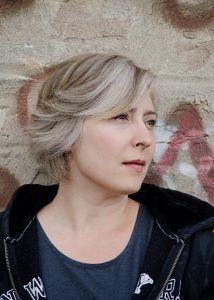Interview: Kit Daven
This week’s interview comes from Kit Daven who I met at Ad Astra a few years ago. I was invited to go to it by my friend Pasi who ran the con suite and I’m really glad I did. I met a bunch of great people, including, as you’ll see, Kit.
Kit Daven Interview
What is your quest? As a writer, my current quest is rooted in the exploration of fictional narrative, primarily novels and short stories. In my youth, I spent many years exploring poetry and short fiction, published my own zines, and attempted several longer works, including an unfinished, abandoned epic fantasy. The maze of fictional narrative is vast, and the paths to be taken many. Here are some of the authors who have stood at pivotal intersections and either handed me a power key or pointed the way.
Roald Dahl was the first to hand me a golden ticket and lead me to the entrance of the maze. In the earliest turns and bends, C. S. Lewis pointed out the rabbit holes and mirrors, and Astrid Lindgren provided me a young companion, a strong girl with carrot-coloured pigtails, who took me in a little deeper. From imaginative hallways down into dark tunnels, Edgar Allan Poe showed me mood, atmosphere, and mystery. H. P. Lovecraft showed me that the unknown and the ambiguous could be effective, and William Hope Hodgson made the sea forever creepy. Later on, a young man in a possessed car drove me a good distance with Stephen King, from whom I learned that in-depth characterization can be done without putting a reader to sleep. William Blake showed me how to develop my own eclectic rhythms and that without self-publishing his work, no one would know his writing today. Tanith Lee pointed the way to the flat earth, where I explored style and concision and how to bend fairytales and myths. Douglas Adams showed me you can be funny and smart at the same time. There have been other writers across the mediums who have been influential, all noteworthy yet too many to list. Recently, I took a turn at George RR Martin and am exploring world building in more depth.
All of them have been teachers. All of them have told me, “Go forth but beware trolls!”
What is your favorite color? Purple. My favourite colour is always purple.
Experimentation is an important aspect for my stories. I tend to start with rules and see how I can bend them. One rule in particular was quite fun to play with while writing A Xiinisi Trilogy. The rule goes like this: unnamed characters shouldn’t be given dialogue. So, I went ahead and gave the occasional unnamed character dialogue, by putting it in italics. I made sure there were several background characters available to chime in on whatever was happening, offering three to four bits of dialogue that acted together as a beat in the narrative. I did this sparingly throughout each novel to great effect.
Who does she think she is?
You can’t do that.
Hack!
Rules Schmules! I learn them mostly to break them, then I play with them until they cry.
When it comes to characters, I love creating foils, because like real people, they want to show you how they see themselves. A foil, however, peels away that veneer and shows you what they are like beneath the surface. In The Forgotten Gemstone, the main character Ule is hungry and tired. She has been invited to sit by a fire where she patiently listens to stories told by a boy. The boy offers her what he’s been cooking over the fire, and after she discovers she’s nearly eaten a roasted spider, she storms off into the desert in a temper tantrum. At this point in the narrative, she’s not as mature as she likes to think she is.
 Kit Daven Portrait
Kit Daven PortraitIn general, I really love to listen to what the story wants, how it wants to be told and presented. A project that I’ve been working on for a couple of years has been calling out for multiple POVs. When I mean multiple, I mean every character will get at least one turn in contributing to the narrative. I’m not sure how to present that yet, but I’ll figure it out.
Oh, and I love the colour orange, too.
What is the average flying speed of an unladen paint brush? (What are some of the challenges you’ve faced that have frustrated you? Maybe some creative failures that you’ve learned from)
The biggest challenge I face is rooted in a huge fail on my part. I quit writing for many years over a decade ago. I’d quit before, but this last time was for good. I was writing straight literary fiction, and I crashed into this wall. I’d get dry tongue when I sat down to write. My body would vibrate and not in a good way. I used to love poetry but couldn’t bring myself to write it anymore, because my favorite pieces elicited zero response from readers. My readers (mostly family and friends) liked the literary stuff. It was good, never great. Then, I decided to try a new approach, and I found this beautiful intersection of writing from both my heart and my mind. However, the reactions I received were ones of discomfort and I often heard, “I couldn’t say that.” At the time, I interpreted these reactions as negative responses.
No longer enjoying the process, I gave up. I stopped writing fiction. I stopped reading. I must have purged a couple hundred books out my library and got them down enough to fill two tall bookshelves, then channeled my creative energy into art. It was, at that time, the right thing to do and a huge relief. Later, however, I realized being a writer is very much a part of who I am, whether I like it or not. To reintroduce myself to the subject, I began reading online about writing and writers and discovered something interesting. Those reactions my readers had all those years ago were, in fact, progress, but I hadn’t recognized it at the time.
The first challenge was to get my writing skills back up to where they were before I quit. So I decided to dive into writing a novel and completing it By Any Means Necessary. That novel turned into a trilogy, and not only has my skill level returned, but I’ve leveled up. The second challenge I continue to struggle with is catching up on reading, especially currently published books. I’m a tortoise. I read slowly, and I write carefully, so I always feel behind the times and suspect I may never catch up to where other writers are. Doesn’t mean I won’t try. 



